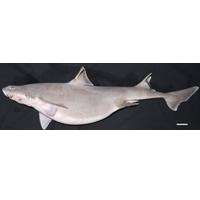Mystery sharks off Rottnest shed new light on species

(Phys.org)—The discovery of two sharks never seen before in Australian waters is set to re-write scientists' understanding of the species.
Shark biologist Ryan Kempster, of The University of Western Australia's Oceans Institute, said the rare sharks were caught off Rottnest Island two years ago at a depth of 430 metres by local recreational fisherman Steve Downs.
Mr Downs gave the two sharks to a group of researchers at UWA's Oceans Institute and School of Biology, and the WA Museum.
The mystery sharks were a male just under a metre long and a pregnant female about 1.2 metres long.
"After two years of thorough investigation which included DNA sequencing, the sharks were identified as mandarin dogfish (Cirrhigaleus barbifer), a species never before seen in Australia," Mr Kempster said.
"This species was known previously to be found only between Indonesia and Japan, and also New Zealand."
It's not known why the sharks were found so far from their normal habitat.
But the find already has scientists re-evaluating their understanding of the species.
"The female shark found off Rottnest had 22 unborn pups and is only the second ever-recorded specimen of a pregnant female of this species," Mr Kempster said.
"Previously, it was thought that the maximum number of pups for this species was 10."
The researchers' findings were announced this week in the Marine Biodiversity Records journal published by Cambridge University Press.
More information: journals.cambridge.org/action/ … Id=S175526721300002X
Provided by University of Western Australia


















